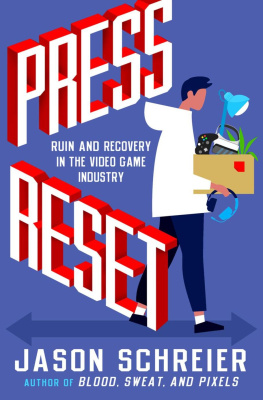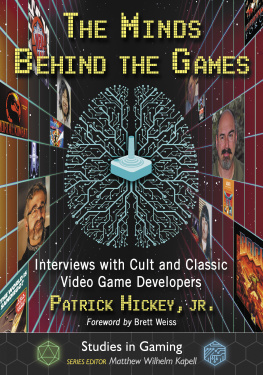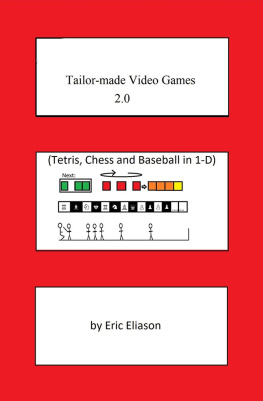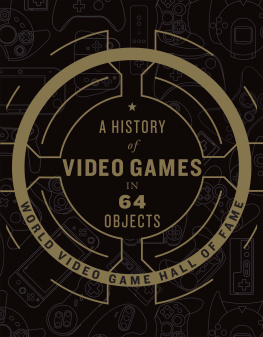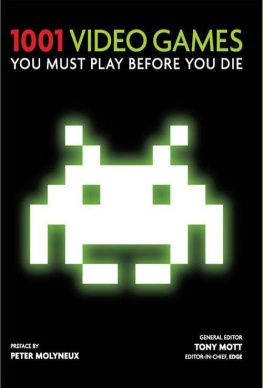Contents
For Amanda
Say you want to make a video game. Youve got this killer ideaits about a mustachioed plumber who has to rescue his princess girlfriend from a giant fire-breathing turtleand youve convinced an investor to give you a few million dollars to make it happen. Now what?
Well, first you need to figure out the exact number of people you can afford to hire. Then you need to call up some artists, some designers, some programmers. Youll need a producer to keep things running smoothly, and a sound department to make sure the game has, you know, sounds. Cant forget to hire some quality-assurance testers to check for bugs. And a marketing savanthow else will everyone know about your future best seller? Once youre all staffed up, youll need to make a strict schedule that determines how much time your team will spend on each part of the game. If all goes well, youll develop a demo for E3 in six months, then be feature complete by the end of the year.
After a few months, things seem to be going well. Your artists are drawing all sorts of cool enemies for your plumber to fight: ghosts, mushrooms, that sort of thing. The designers have sketched out some clever levels that will guide the player through raging volcanoes and fetid swamps. The programmers just figured out a fancy rendering trick that will make the dungeons look more realistic than anything youve seen before. Everyone is motivated, the game is making progress, and youre handing out stock options like theyre free newspapers in the subway.
One morning, you get a call from your producer. Turns out that rendering trick is useless, because it knocks your games frame rate down to ten frames per second. The playtesters keep getting stuck on the volcano level, and your marketing guy is grumbling about how that might affect your Metacritic score. Your art director insists on micromanaging the animators, which is driving them crazy. Your E3 demo is due in two weeks, and you know theres no way you can get it done in less than four. And suddenly the investors are asking if maybe you can slash that $10 million budget down to $8 million, even if you have to let go of a few people to make it happen.
A week ago, you were fantasizing about the speech youd make at The Game Awards after taking home Game of the Year. Now youre wondering if youll ever even finish.
I once had drinks with a developer whod just shipped a new game. He looked exhausted. He and his team had been right near the goal line, he said, when they were hit with a revelation: one of the games biggest features wasnt actually fun to play. The developers team had to spend the next few months crunching, working eighty- to one-hundred-hour weeks to scrap the feature and overhaul everything they had done to that point. Some of them slept in the office so they wouldnt have to waste time commuting, because every hour spent in the car was an hour not spent fixing bugs. Up until the day they had to submit a final build, many of them doubted theyd be able to release the game at all.
Sounds like a miracle that this game was even made, I said.
Oh, Jason, he said. Its a miracle that any game is made.
In the years Ive been reporting on the world of video games, thats been a common theme. Developers everywhere, whether at tiny independent studios or publicly traded corporations, talk frequently about how difficult it is to design and produce games. Walk into any San Francisco bar during the annual Game Developers Conference (GDC) and youre bound to find groups of weary designers trying to one-up each other with stories of coding binges and caffeine-fueled all-nighters. War metaphors are commontales from the trenches is a ubiquitous expressionas are choruses of complaints that the outside world doesnt get it. One surefire way to annoy a game developer is to ask, in response to discovering his or her chosen career path, what its like to spend all day playing video games.
But even if you accept the premise that video game development is grueling work, its not easy for those of us on the outside to see why. People have been making games since the 1970s, havent they? With decades of lessons and experience to draw from, shouldnt game development have grown more efficient? Maybe it made sense for developers to crunch in the late 1980s, when gaming was the domain of teens and twentysomethings who gorged on pizza and Diet Coke as they coded all night and slept all day, but decades later, video games fuel a $30 billion industry in the United States alone. Why do game developers still have so many stories about staying at the office until 3:00 a.m.? Why is it still so difficult to make video games?
To try to answer these questions, I went out and engaged in my favorite activity: bothering people who know way more than I do. I spoke to around one hundred game developers and executives, both on and off the record, asking them an endless number of nosy questions about their lives, their jobs, and why they sacrifice so much to make video games.
There are ten chapters in this book, each telling the story behind how a different video game was made. One chapter visits Irvine, California, for a look at how the Kickstarter-funded Pillars of Eternity helped Obsidian Entertainment recover from its darkest days. Another chapter heads to Seattle, Washington, where the twentysomething Eric Barone shut himself alone in a room for nearly five years to create a serene farming game called Stardew Valley. Other chapters tell stories about Dragon Age: Inquisitions technological nightmare, Uncharted 4s brutal time crunch, and even the mystery behind LucasArts much-hyped Star Wars 1313.
As you read, many of these stories may strike you as anomalousgames that were hampered by drastic technology changes, directorial shifts, or other wild factors beyond the developers control. Its tempting to think, while reading these stories, that these games were all made under abnormal sets of circumstances. That these people were just unlucky. That the developers of these games might have averted hardship if they had followed industry standards and avoided common pitfalls, or if they had made smarter decisions from the get-go.
Heres an alternative theory: every single video game is made under abnormal circumstances. Video games straddle the border between art and technology in a way that was barely possible just a few decades ago. Combine technological shifts with the fact that a video game can be just about anything, from a two-dimensional iPhone puzzler to a massive open-world RPG with ber-realistic graphics, and it shouldnt be too shocking to discover that there are no uniform standards for how games are made. Lots of video games look the same, but no two video games are created the same way, which is a pattern youll see throughout this book.
But why is it so hard to make them? If, like me, you have never tried to develop a commercial video game before, you might find it helpful to review a few possible theories.
1. Theyre interactive. Video games dont move in a single linear direction. Unlike, say, a computer-rendered Pixar movie, games run on real-time graphics, in which new images are generated by the computer every millisecond. Video games, unlike Toy Story, need to react to the players actions. As you play a video game, your PC or console (or phone, or calculator) renders characters and scenes on the fly based on your decisions. If you choose to walk into a room, the game needs to load up all the furniture. If you choose to save and quit, the game needs to store your data. If you choose to murder the helpful robot, the game needs to identify (a) whether its possible to kill the robot, (b) whether youre powerful enough to kill the robot, and (c) what kind of awful sounds the robot will make as you spill its metallic guts. Then the game might have to remember your actions, so other characters know that youre a heartless murderer and can say things like, Hey, youre that heartless murderer!

